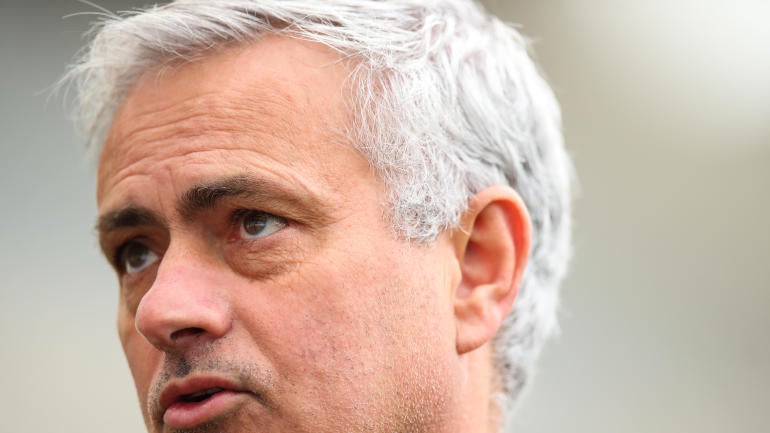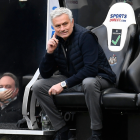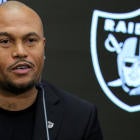
Tottenham Hotspur had the chance to, at least temporarily, move into the Premier League's top four on Sunday. They declined to take it. The team, as they have so often this season, conceded in the 87th minute to draw with lowly Newcastle 2-2, a result that left them in fifth place with 49 points, tied with Liverpool two points behind fourth place Chelsea.
After the match, Spurs manager Jose Mourinho left no doubt about who was to blame for the defeat. He was asked why his team is so poor at defending leads when it's been something that historically the teams he's managed have been terrific at. Here's what he said:
Jose Mourinho did not hold back 😳 pic.twitter.com/CJBjvZqpdi
— Champions League on CBS Sports (@UCLonCBSSports) April 4, 2021
Same coach, different players indeed. Jose Mourinho's players are not particularly good at defending. You might not recognize that from their topline numbers, which are deceiving. They've only conceded 1.07 goals per match, that's the third-best total in the league. Look a little deeper, however, and the numbers get uglier. Spurs conceded 12.57 shots per match, there are only eight teams in the league that concede more. They concede 1.30 expected goals per match, exactly league average.
Their stingy defensive record is not the result of a side that is difficult to score goals against, rather it's the result of Hugo Lloris having another excellent shot-stopping season in goal. No team has a larger gap between its expected goals on target conceded and actual goals conceded than Spurs' 4.66.
Craving even more coverage of the world's game? Listen below and follow ¡Qué Golazo! A Daily CBS Soccer Podcast where we take you beyond the pitch and around the globe for commentary, previews, recaps and more.
All of which is to say that Spurs' defense isn't good, and Mourinho, as he said after the match, knows it. And yet. Spurs continue to invite pressure. Match after match when they have a lead they sit back and allow teams to challenge their defense. Spurs have conceded a mind boggling eight goals after the 75th minute when they have a lead, by far the most in the league (Liverpool are second with five goals conceded). And they've only gotten a little unlucky along the way, conceding 5.45 xG in those situations, again the most in the league.

It's even worse than that for Spurs though, because the narrow framing on defending leads obscures the fact that Spurs have in fact been fairly fortunate to have as many leads to defend as they have. When the match is tied Spurs have scored 24 times to take the lead. That's the fourth most in the Premier League. But their xG in those situations is only 17.94, the 10th-best total. They've scored about six more goals than xG predicts. It would be tempting to ascribe the difference to the sharp shooting of attackers like Harry Kane and Heung-min Son but Spurs post-shot xG in those situations (a model which takes into account elements like where on frame the shot is) suggests that those opportunities are still only worth 18.19 xG. That is, it's less that Spurs are sticking the ball in the upper 90 and more that they're hitting relatively average shots but finding the back of the net anyway.
And indeed that's what happened against Newcastle, albeit with the added wrinkle that Spurs fell behind in the match first. The match was 2-2 by the end, but when the scoring started with a 28th minute goal from Joelinton, Spurs were already being outshot 8 to 2 and trailing in xG 1.86 to 0.13. Newcastle were sticking it to them. It was a minor miracle then that Spurs managed to even take the lead thanks to two rapid fire goals from Kane on the next two shots in the match. So, when Spurs ultimately took the lead they were ahead on the scoresheet 2-1 while having been outshot 8-4 and trailing the xG battle 1.86 to 1.29. When you're getting outplayed like that, it's no surprise at all when your defense can't manage to keep the ball out of the net for the next hour.
These, of course, are all things a manager should know. He should know that his defense's overall record is misleading, and that, in fact they are an average group of players. He should know that his team is riding its fortune to have leads to defend in the first place. He should know that protecting those leads by sitting back is asking for trouble, since Spurs' defense is quite clearly suspect. He should know that successes at the beginnings of matches are the fluke, and their failures at the end that are to be expected. Spurs players may not be good enough, but ultimately it is Mourinho who is putting them in position to fail over and over again.
Mourinho is right that he is the same manager he has always been. He is right that if he had better defenders than Spurs current corps his side would likely be defending more leads. But, what is the point of a manager if all he does is point out his team's flaws to the media? The managers job is to try and avoid predictable problems, not point them out after the fact. Mourinho is right that it's the same manager and different players. But if the same manager can't make different players into a better team, then it's time for a different manager to take those same players and try a new approach.





















